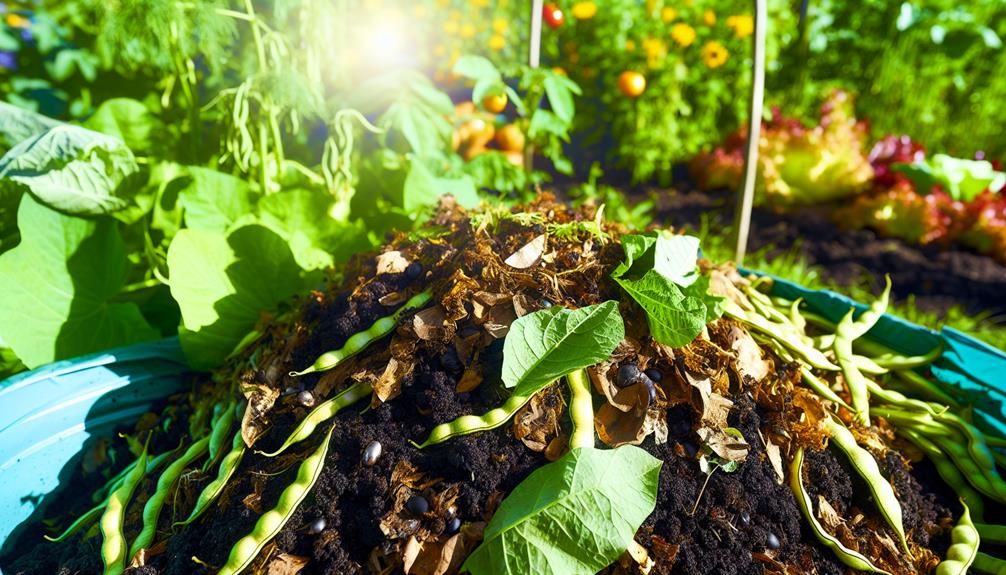

You can absolutely compost broad beans, and they bring fantastic benefits to your garden soil. Rich in essential nutrients like nitrogen, phosphorus, and potassium, broad beans break down quickly, providing a rapid boost to your compost. To get the best results, chop the beans into smaller pieces and slightly crush them.
Make sure your compost pile is moist, but not soggy, and keep turning it for proper aeration. Balance green materials like broad beans with brown materials such as leaves or paper for the most effective decomposition. This creates a nutrient-rich compost that will supercharge your plant growth! Stick around to uncover more essential composting tips.
Composting broad beans enriches your garden soil with essential nutrients, boosting plant growth. When you compost broad beans, you’re not just reducing waste; you’re also creating a rich, organic material that enhances soil structure. This improvement helps retain moisture and supports beneficial microorganisms, which in turn, fosters a healthier garden environment.
You’ll find your plants becoming more vibrant and resilient. Plus, incorporating broad beans into your compost pile is straightforward and effective. By doing this, you’re joining a community of gardeners dedicated to sustainable practices, making a positive impact on the planet.
Embrace this eco-friendly method and watch your garden thrive, knowing you’re contributing to a greener world and experiencing the joy of gardening at its best.
Also Read: Can You Compost Artichoke?
Have you ever wondered what makes broad beans such a powerhouse of nutrients for your compost? These legumes are packed with essential nutrients that can supercharge your compost pile, making it more fertile and beneficial for your garden.
Here’s a quick look at the nutrient profile of broad beans:
| Nutrient | Benefit |
|---|---|
| Nitrogen | Promotes leaf and stem growth |
| Phosphorus | Enhances root development |
| Potassium | Improves overall plant health |
Broad beans not only enrich your compost with these key nutrients, but they also decompose relatively quickly, helping to speed up the composting process. By adding broad beans to your compost, you’re ensuring a nutrient-rich, balanced compost that will support the thriving garden you desire.
To maximize the benefits of broad beans in your compost, it’s important to prepare them properly before adding them to the pile.
First, chop the broad beans into smaller pieces to speed up decomposition. Smaller fragments break down faster, helping to integrate nutrients more quickly. You can even crush them slightly to expose more surface area. Removing any diseased or moldy parts guarantees a healthier compost pile, preventing the spread of potential pathogens.
Mixing the beans with other organic materials, like leaves and kitchen scraps, creates a balanced composition. Remember, variety is key to a thriving compost community.
Achieving the best results from your compost requires maintaining the ideal conditions for decomposition. You’ll need to focus on temperature, moisture, and aeration.
Aim for a temperature between 135-160°F; this range accelerates the breakdown of materials and kills harmful pathogens. Keep your compost moist, like a wrung-out sponge, to support microbial activity without creating a soggy mess.
Turn your pile regularly to introduce oxygen, essential for aerobic bacteria to thrive and break down the organic matter efficiently.
Also Read: Can You Compost Apricot Pit?
Balancing green and brown materials is crucial to maintaining those ideal composting conditions you’ve established. Greens, like broad bean plants, are rich in nitrogen which fuels the decomposition process. Browns, such as dead leaves or cardboard, are carbon-rich and provide structure to your compost.

Aim for a ratio of about 2:1 browns to greens. Too many greens can make your compost pile soggy and smelly, while too many browns slow decomposition. Mixing both types evenly helps maintain the right moisture and air flow, creating a thriving environment for microorganisms.
To avoid common composting mistakes when using broad beans, you need to focus on proper bean preparation and maintaining the balance of your compost pile.
Make sure you chop the beans into smaller pieces to speed up decomposition, and always mix them with a good ratio of green and brown materials.
Properly preparing broad beans for composting guarantees they break down efficiently and contribute beneficial nutrients to your compost pile. First, make sure to chop the beans into smaller pieces. This increases the surface area, helping microbes break down the material faster.
Watch out for any diseased or moldy beans, as they can introduce unwanted pathogens to your compost. It’s also a good idea to remove any large stems or tough parts, which decompose more slowly.
By taking these steps, you secure a smoother composting process and a healthier compost pile. Joining a community of eco-conscious gardeners, you’re promoting sustainable practices and making a positive impact on the environment.
Happy composting!
Maintaining compost balance guarantees that your pile decomposes efficiently and produces rich, fertile compost. You’ll need to balance green materials, like broad beans and kitchen scraps, with brown materials, such as dried leaves and cardboard. This balance ensures the correct mix of nitrogen and carbon, vital for the breakdown process.
Turn your pile regularly to introduce oxygen, preventing it from becoming too compacted and smelly. Keep it moist, but not too wet, to support microbial activity. Avoid adding dairy, meat, or oily foods, as they attract pests and slow decomposition.
Also Read: Can You Compost Almond Shell?
When your compost is healthy, you’ll notice it’s dark, crumbly, and has an earthy smell. These signs indicate that your compost is rich in nutrients and ready to benefit your garden.

To confirm that your compost is on the right track, look for the following:
Now that you have healthy compost, it’s time to enrich your garden with its nutrient-packed goodness. Spread a layer of compost around the base of your plants, mix it into the soil to boost fertility, and watch your garden flourish. Compost improves soil structure, retains moisture, and provides essential nutrients.
Here’s a simple table to help you remember how to use your compost:
| Step | Action | Benefit |
|---|---|---|
| 1. Spread | Layer compost around plants | Improves soil structure |
| 2. Mix | Blend compost with soil | Boosts fertility |
| 3. Water | Water after applying compost | Enhances nutrient absorption |
Using compost creates a thriving ecosystem, making you a part of a community that nurtures the earth. Enjoy the transformation!
Composting broad beans is a fantastic way to enrich your garden soil with essential nutrients. By balancing green materials like broad beans with brown materials such as dry leaves, you’ll create a thriving compost pile.
Keep an eye on moisture levels and turn the compost regularly for best results. Your garden will benefit from healthier plants and better yields, making the effort totally worth it.
So, start composting those broad beans and watch your garden flourish!
